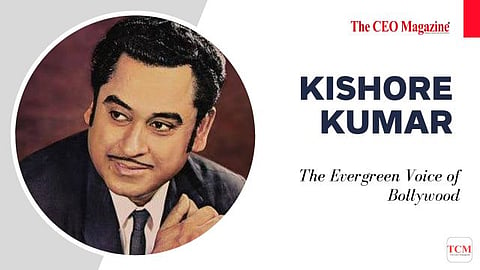

Kishore Kumar
In the annals of Bollywood music, Kishore Kumar's name shines like a luminous star, leaving an indelible mark on the hearts of music lovers. Born as Abhas Kumar Ganguly on August 4, 1929, in Khandwa, Madhya Pradesh, Kishore Kumar was not just a playback singer but a versatile artist, actor, and composer who transcended the boundaries of his time.
Kishore Kumar's journey into the world of music was influenced by his illustrious family. Raised in a family with a rich musical heritage, Kishore was the youngest of four siblings. His elder brother, Ashok Kumar, was a renowned actor in the Indian film industry. The family's move to Mumbai provided the young Kishore with a platform to explore his musical talents.
Kishore Kumar's entry into the music industry was not without its challenges. Initially, he faced rejection and struggled to find his footing. However, his persistence paid off, and he gained recognition for his unique voice and style. His breakthrough came with the song "Marne Ki Duayen Kyon Mangu" in the film "Ziddi" (1948). From there, Kishore Kumar's journey to stardom began.
What sets Kishore Kumar apart is his unparalleled versatility. Whether it was the soulful rendition of romantic melodies, the energetic beats of peppy numbers, or the emotional depth in his sad songs, Kishore Kumar's voice effortlessly adapted to the mood of the composition. His ability to convey a myriad of emotions through his voice made him the quintessential playback singer.
Kishore Kumar collaborated with some of the most celebrated music directors of his time, including R.D. Burman, S.D. Burman, and Kalyanji-Anandji. The magic they created together resulted in timeless classics like "Yeh Jo Mohabbat Hai," "Roop tera mastana," and "Zindagi Ke Safar."
In addition to his musical prowess, Kishore Kumar showcased his acting skills in various films. Movies like "Chalti Ka Naam Gaadi" and "Padosan" highlighted his comedic timing and on-screen charisma. His ability to seamlessly switch between singing and acting made him a unique and beloved figure in the Indian entertainment industry.
Kishore Kumar's contribution to the world of music was acknowledged with numerous awards, including eight Filmfare Awards for Best Male Playback Singer. His rendition of "Khaike Paan Banaras Wala" from the film "Don" remains one of the most iconic performances of his career.
Kishore Kumar was married four times. His first marriage to Bengali singer Ruma Guha Thakurta lasted from 1950 to 1958. His second marriage to actress Madhubala ended with her death in 1969. His third marriage to Yogeeta Bali lasted from 1976 to 1978, and his fourth marriage to Leena Chandavarkar began in 1980 and continued until his death. Kumar, known for his insistence on prompt payment, had unique ways of expressing his displeasure, such as doing half his makeup for half the payment. Despite his eccentricities, he engaged in charity work and free shows for various causes, maintaining a private and introspective lifestyle. Kumar's idiosyncrasies extended to the film industry, including incidents like driving to Khandala after a shoot due to a missed "Cut" command. His complex persona included eccentricities like putting a "Beware of Kishore" sign on his flat's door and claiming to converse with trees in his garden as his closest friends.
Even decades after his passing in 1987, Kishore Kumar's legacy lives on. His songs continue to be a source of joy and nostalgia for music enthusiasts across generations. His impact on Bollywood music is immeasurable, and his evergreen voice continues to resonate through the melodies that have become timeless classics.
Kishore Kumar's journey from a small town in Madhya Pradesh to the pinnacle of Bollywood music is a testament to his unparalleled talent and unwavering passion for his craft. His voice, marked by its versatility and emotive depth, remains etched in the memories of millions. Kishore Kumar, the man with the golden voice, will forever be remembered as the soul of Indian playback singing, a musical maestro whose influence transcends the boundaries of time.
Follow us on Google News
